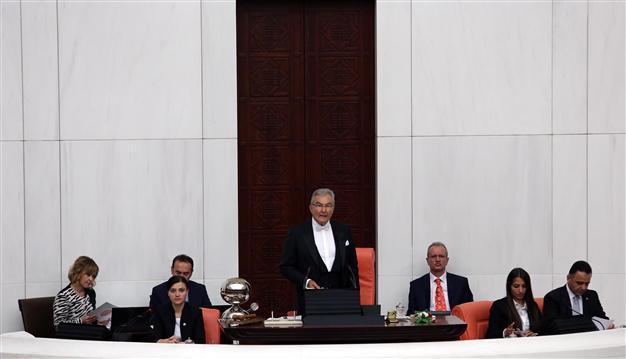Speaker election first mission for parliament
ANKARA

DHA photo
Turkey’s newly elected deputies are getting down to business after taking their parliamentary oaths in an effort to elect a parliamentary speaker despite the absence of a coalition government.
In line with rules of procedure, the first sitting was chaired by the eldest deputy, Deniz Baykal of the Republican People’s Party (CHP), who has been tipped to run for the job permanently. President Recep Tayyip Erdoğan also attended the opening of the ceremony.
Those who want to run for the number two position of the Turkish state have until midnight on June 27 to apply.
Parliament’s Board of Spokespersons did not lose time in setting the calendar for the election of the parliamentary speaker. According to a decision made by the board on June 23, while the oath-taking ceremony was still continuing, the first and the second rounds will take place on June 30. The third and fourth rounds, if necessary, will be held the following day.
The speaker is elected by secret ballot. Contenders have to reach a two-thirds majority in the first two rounds, while an absolute majority is sufficient in the third round of voting. None of the four political parties have a simple majority and in the highly likely case that an absolute majority is not obtained on the third ballot, a fourth ballot will take place between the two candidates who obtain the most votes. In the fourth ballot, the candidate receiving the highest number of votes will be elected speaker. In such an event, a candidate from the Justice and Development Party (AKP), which has the highest number of seats, will be elected if the three other parties cannot compromise and agree on a name.
‘Polarization and secularity’With Erdoğan looking on, Baykal, a former leader of the CHP, declared the session open. After a bruising election campaign, Baykal urged for calm in Turkey, while underlining the utmost need for ending polarization in society and the vital importance of secularity.
Yet, in a sign of the divisions, deputies of the three parties other than the AKP refused to applaud Erdoğan as he was announced by Baykal.
“As a result of the bittersweet experiences of a lengthy single-party rule, our nation’s decision has been in accordance with reconciling and ruling by making cooperation,” Baykal said.
“Conditions no longer exist for the continuation of the polarization of society which emerged in the wake of tensions, conflicts and impositions in the past,” he said.
The veteran politician also called for the respect of the secular traditions of the republic: “In a democratic society, freedom of religion and faith naturally leads to religion and faith organizations. But this situation should not result in the deployment of religion and faith organizations in fields of hot politics and the bureaucracy. Bitter incidents which occurred in Turkey and wars and conflicts in our neighborhood force us to once more explore the importance of secularity.”
MandateErdoğan is expected to give the mandate to Prime Minister Ahmet Davutoğlu on either the same day or shortly after the parliamentary speaker is elected. This will launch a 45-day period to form the government, which is expected to end in mid-August. Davutoğlu is planning to form his government within 15 days before returning the mandate to Erdoğan. In the event no government is formed in 45 days, Erdoğan will call for early elections to take place in 90 days. In this sense, the elections could be repeated Nov. 15 under the rule of an interim government composed of the four political parties present in the legislature according to their proportions.
